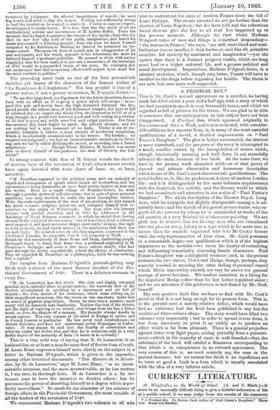A PRODIGAL SON.*
'rues is Mr. Cook's second appearance as a novelist, he having made his debut about a year and a half ago, with a story of which we had occasion to speak in very favourable terms, and which we regarded as full of promise for the future. We are glad to be able to announce that our anticipations on this subject have not been disappointed. A Prodigal Son, which appeared originally in the columns of Once a Week, and is now re-issued, with consider- able additions in a separate form, is, in many of the most essential qualifications of a novel, a decided improvement on "Paul Foster's Daughter." The plot is better constructed, the interest is more sustained, and the progress of the story is interrupted to a much smaller extent by the interpolation of scenes which, though intrinsically amusing and well done, do not materially advance the main business of the book. At the same time, we have in the present work abundant evidence of that power of shrewd and minute observation and humorous description which is one of Mr. Cook's most characteristic qualifications. The novel before us, is, like its predecessor, a story of modern London life ; and it is distinguished by the same intimate acquaintance with the theatrical, the artistic, and the literary world to which we had occasion to call attention in our notice of " Paul Foster's Daughter." The whole description of the Theatre Royal, Long Acre, wills its energetic but slightly disreputable manager, is ad- mirably done ; and the sketch of the genial picture-dealer, who re'- gards all the persons by whom he is surrounded as works of the old masters, is a very finished bit of character-painting. We are glad, too, to observe that the literary men who are introduced into the present story, belong to a type which is far more true to nature than the amiable vagabond who is in Mr Cook's former work the only representative of that class. Mr. Cook possesses to a remarkable degree one qualification which is of the highest importance to the novelist—we mean the faculty of conceiving and delineating remarkably charming female characters. Paul Foster's daughter was a delightful creature ; and, in the present instance, the two sisters, 'Violet and Madge, though, perhaps, they scarcely succeed in arousing the same feeling of personal regard which Silvia irresistibly excited, are very far above the general average of novel heroines. We confess ourselves to a liking for the impulsive Madge rather than for her better regulated sister ; and we are mistaken if this preference is not shared by Mr. Cook himself.
The only positive fault that we have to find with Mr. Cook's novel is that it is not long enough for its present form. This is, in the present case, a merely relative defect, which would have had no existence had the book been published in any but the traditional three-volume shape. The story would have filled two volumes very respectably ; but in order to spread it over three, it has been necessary to print it so widely as to produce an effect which is far from pleasant. There is a general prejudice against these very light pages, arising probably from a presenti- ment—which in the majority of cases is well founded—that the substance of the book will exhibit a flimsiness corresponding to that which is so conspicuous in its outward appearance. The very reverse of this is, we need scarcely say, the case in the present instance ; but we cannot but think it an injudicious act to issue so good a book in a form which is usually associated with the idea of a very inferior article.






























 Previous page
Previous page